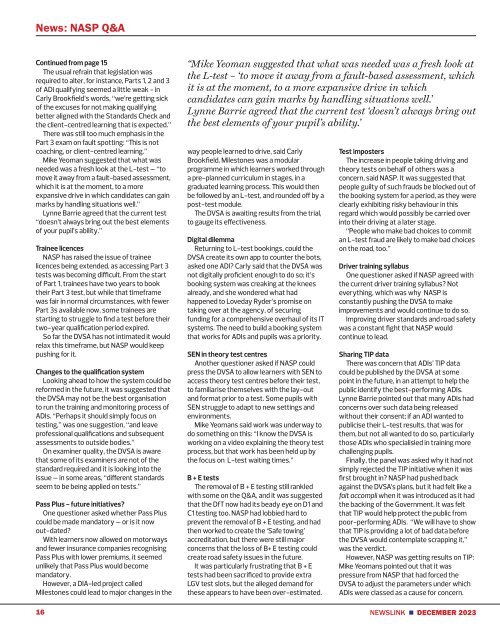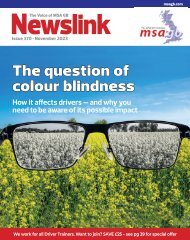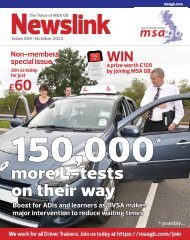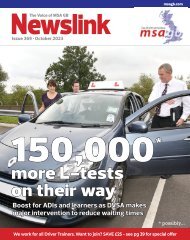Newslink December final
Motor Schools Association members magazine; driver training and testing; road safety
Motor Schools Association members magazine; driver training and testing; road safety
Create successful ePaper yourself
Turn your PDF publications into a flip-book with our unique Google optimized e-Paper software.
News: NASP Q&A<br />
Continued from page 15<br />
The usual refrain that legislation was<br />
required to alter, for instance, Parts 1, 2 and 3<br />
of ADI qualifying seemed a little weak - in<br />
Carly Brookfield’s words, “we’re getting sick<br />
of the excuses for not making qualifying<br />
better aligned with the Standards Check and<br />
the client-centred learning that is expected.”<br />
There was still too much emphasis in the<br />
Part 3 exam on fault spotting: “This is not<br />
coaching, or client-centred learning.”<br />
Mike Yeoman suggested that what was<br />
needed was a fresh look at the L-test – “to<br />
move it away from a fault-based assessment,<br />
which it is at the moment, to a more<br />
expansive drive in which candidates can gain<br />
marks by handling situations well.”<br />
Lynne Barrie agreed that the current test<br />
“doesn’t always bring out the best elements<br />
of your pupil’s ability.”<br />
Trainee licences<br />
NASP has raised the issue of trainee<br />
licences being extended, as accessing Part 3<br />
tests was becoming difficult. From the start<br />
of Part 1, trainees have two years to book<br />
their Part 3 test, but while that timeframe<br />
was fair in normal circumstances, with fewer<br />
Part 3s available now, some trainees are<br />
starting to struggle to find a test before their<br />
two-year qualification period expired.<br />
So far the DVSA has not intimated it would<br />
relax this timeframe, but NASP would keep<br />
pushing for it.<br />
Changes to the qualification system<br />
Looking ahead to how the system could be<br />
reformed in the future, it was suggested that<br />
the DVSA may not be the best organisation<br />
to run the training and monitoring process of<br />
ADIs. “Perhaps it should simply focus on<br />
testing,” was one suggestion, “and leave<br />
professional qualifications and subsequent<br />
assessments to outside bodies.”<br />
On examiner quality, the DVSA is aware<br />
that some of its examiners are not of the<br />
standard required and it is looking into the<br />
issue – in some areas, “different standards<br />
seem to be being applied on tests.”<br />
Pass Plus - future initiatives?<br />
One questioner asked whether Pass Plus<br />
could be made mandatory – or is it now<br />
out-dated?<br />
With learners now allowed on motorways<br />
and fewer insurance companies recognising<br />
Pass Plus with lower premiums, it seemed<br />
unlikely that Pass Plus would become<br />
mandatory.<br />
However, a DIA-led project called<br />
Milestones could lead to major changes in the<br />
“Mike Yeoman suggested that what was needed was a fresh look at<br />
the L-test – ‘to move it away from a fault-based assessment, which<br />
it is at the moment, to a more expansive drive in which<br />
candidates can gain marks by handling situations well.’<br />
Lynne Barrie agreed that the current test ‘doesn’t always bring out<br />
the best elements of your pupil’s ability.’<br />
way people learned to drive, said Carly<br />
Brookfield. Milestones was a modular<br />
programme in which learners worked through<br />
a pre-planned curriculum in stages, in a<br />
graduated learning process. This would then<br />
be followed by an L-test, and rounded off by a<br />
post-test module.<br />
The DVSA is awaiting results from the trial,<br />
to gauge its effectiveness.<br />
Digital dilemma<br />
Returning to L-test bookings, could the<br />
DVSA create its own app to counter the bots,<br />
asked one ADI? Carly said that the DVSA was<br />
not digitally proficient enough to do so; it’s<br />
booking system was creaking at the knees<br />
already, and she wondered what had<br />
happened to Loveday Ryder’s promise on<br />
taking over at the agency, of securing<br />
funding for a comprehensive overhaul of its IT<br />
systems. The need to build a booking system<br />
that works for ADIs and pupils was a priority.<br />
SEN in theory test centres<br />
Another questioner asked if NASP could<br />
press the DVSA to allow learners with SEN to<br />
access theory test centres before their test,<br />
to familiarise themselves with the lay-out<br />
and format prior to a test. Some pupils with<br />
SEN struggle to adapt to new settings and<br />
environments.<br />
Mike Yeomans said work was underway to<br />
do something on this: “I know the DVSA is<br />
working on a video explaining the theory test<br />
process, but that work has been held up by<br />
the focus on L-test waiting times.”<br />
B + E tests<br />
The removal of B + E testing still rankled<br />
with some on the Q&A, and it was suggested<br />
that the DfT now had its beady eye on D1 and<br />
C1 testing too. NASP had lobbied hard to<br />
prevent the removal of B + E testing, and had<br />
then worked to create the ‘Safe towing’<br />
accreditation, but there were still major<br />
concerns that the loss of B+ E testing could<br />
create road safety issues in the future.<br />
It was particularly frustrating that B + E<br />
tests had been sacrificed to provide extra<br />
LGV test slots, but the alleged demand for<br />
these appears to have been over-estimated.<br />
Test imposters<br />
The increase in people taking driving and<br />
theory tests on behalf of others was a<br />
concern, said NASP. It was suggested that<br />
people guilty of such frauds be blocked out of<br />
the booking system for a period, as they were<br />
clearly exhibiting risky behaviour in this<br />
regard which would possibly be carried over<br />
into their driving at a later stage.<br />
“People who make bad choices to commit<br />
an L-test fraud are likely to make bad choices<br />
on the road, too.”<br />
Driver training syllabus<br />
One questioner asked if NASP agreed with<br />
the current driver training syllabus? Not<br />
everything, which was why NASP is<br />
constantly pushing the DVSA to make<br />
improvements and would continue to do so.<br />
Improving driver standards and road safety<br />
was a constant fight that NASP would<br />
continue to lead.<br />
Sharing TIP data<br />
There was concern that ADIs’ TIP data<br />
could be published by the DVSA at some<br />
point in the future, in an attempt to help the<br />
public identify the best-performing ADIs.<br />
Lynne Barrie pointed out that many ADIs had<br />
concerns over such data being released<br />
without their consent; if an ADI wanted to<br />
publicise their L-test results, that was for<br />
them, but not all wanted to do so, particularly<br />
those ADIs who specialisied in training more<br />
challenging pupils.<br />
Finally, the panel was asked why it had not<br />
simply rejected the TIP initiative when it was<br />
first brought in? NASP had pushed back<br />
against the DVSA’s plans, but it had felt like a<br />
fait accompli when it was introduced as it had<br />
the backing of the Government. It was felt<br />
that TIP would help protect the public from<br />
poor-performing ADIs. “We will have to show<br />
that TIP is providing a lot of bad data before<br />
the DVSA would contemplate scrapping it,”<br />
was the verdict.<br />
However, NASP was getting results on TIP:<br />
Mike Yeomans pointed out that it was<br />
pressure from NASP that had forced the<br />
DVSA to adjust the parameters under which<br />
ADIs were classed as a cause for concern.<br />
16 NEWSLINK n DECEMBER 2023
















